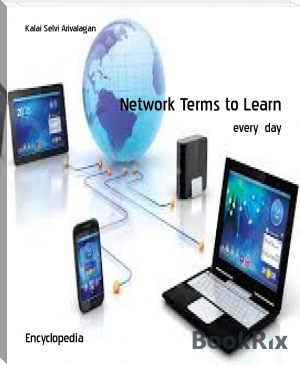Network Terms to Learn, Kalai Selvi Arivalagan [books to read in a lifetime .TXT] 📗

- Author: Kalai Selvi Arivalagan
Book online «Network Terms to Learn, Kalai Selvi Arivalagan [books to read in a lifetime .TXT] 📗». Author Kalai Selvi Arivalagan
Doxware
Doxware is a type of ransomware that threatens to release personal data to the public if the user does not pay the ransom. The term comes from the hacker term "doxing," or releasing confidential information over the internet. Doxware attacks frequently infect computers from phishing emails. Doxware is also known as extortionware.
Supply Chain Visibility
Supply chain visibility (SCV) is the trackability or traceability of product orders and physical product shipments from the production source to their destination. This includes logistics activities and transport as well as the state of events and milestones that take place before and during transit.
The objective of SCV is to enhance and empower the supply chain by making information easily accessible to each and every stakeholder, including customers. The integration of SCV tools or systems enables different supply chain divisions in an organization to acquire real-time and precise information regarding stock, orders and deliveries in their incoming and outgoing networks.
Labor Management System
A labor management system (LMS) is comprised of enterprise tools that help businesses better plan their daily work and processes for better delivery of products and services. These tools are intended to facilitate "labor productivity reporting" and to help analyze units of labor and units of time to enable tracking of changes.
Python
Python is a multiparadigm, general-purpose, interpreted, high-level programming language. Python allows programmers to use different programming styles to create simple or complex programs, get quicker results and write code almost as if speaking in a human language. Some of the popular systems and applications that have employed Python during development include Google Search, YouTube, BitTorrent, Google App Engine, Eve Online, Maya and iRobot machines.
Term of the day - 28
Master Data Management
Master data management (MDM) is the management of specific key data assets for a business or enterprise. MDM is part of data management as a whole, but is generally focused on the handling of higher level data elements, such as broader identity classifications of people, things, places and concepts.
Very High Density Cable Interconnect
A Very High Density Cable Interconnect (VHDCI) is an improved type of SCSI hardware used as an external connector for SCSI cables and devices. The SCSI interface is a set of standards that transfers data and physically connects a computer and a peripheral device. The VHDCI is defined as an SPI-2 standard and is a smaller version of the older high-density 68-pin connectors. It was introduced in the SPI-3 document of SCSI-3. The SCSI-3 is the third generation of SCSI; a standard that introduced Fast-20 and Fast-40 and includes high-speed serial bus architecture such as IEEE 1394, Fibre Channel, and Serial Storage Architecture (SSA). The benefit of VHDCI is that it is very small. Two connectors can be crowded next to each other inside the width of a SCSI host adapter's back edge or expansion slot insert. This allows the placement of four wide SCSI connectors on the back of a single Peripheral Component Interconnect (PCI) card slot.
Virtual Dedicated Server
A virtual dedicated server (VDS) is an Infrastructure as a Service (IaaS) cloud offering that allows users to provision an isolated server over the Internet. It provides functionality and resources similar to an in-house server but is managed on a rental basis by a cloud service provider. A VDS provides small-full scale server instances, depending on the provider's resource requirements and capabilities.
Geofencing
Geofencing is a technology that defines a virtual boundary around a real-world geographical area. In doing so, a radius of interest is established that can trigger an action in a geo-enabled phone or other portable electronic device.
Waterfall Model
The waterfall model is a sequential software development process model that follows the following defined phases:
-Conception
-Initiation
-Analysis
-Design
-Construction
-Testing
-Production/Implementation
-Maintenance
Using the software development life cycle's (SDLC) common steps, the waterfall model enforces moving to the next phase only after completion of the previous phase. Returning to a previous phase is frowned upon unless there is a clear need to do so.
Service-Oriented Modeling and Architecture
Service-oriented modeling and architecture (SOMA) is a methodology for modeling service-oriented architecture (SOA) applications. SOMA is an end-to-end analysis and design method that extends traditional object-oriented and component-based analysis and design methods.
Sequence Diagram
A sequence diagram, in the context of UML, represents object collaboration and is used to define event sequences between objects for a certain outcome. A sequence diagram is an essential component used in processes related to analysis, design and documentation. A sequence diagram is also known as a timing diagram, event diagram and event scenario.
SciPy
SciPy is a free open-source Python library included in a suite of tools that also includes general-purpose algorithm resources allowing engineers to get into the process of algorithm development in Python.
Segment Routing
Segment routing is a specific type of engineering for packet delivery that combines multiple packets in ordered lists for specific trajectory delivery. Segment routing provides an alternative to source routing and works with IPv6 network infrastructure.
Scikit-Learn
Scikit-learn is a key library for the Python programming language that is typically used in machine learning projects. Scikit-learn is focused on machine learning tools including mathematical, statistical and general purpose algorithms that form the basis for many machine learning technologies. As a free tool, Scikit-learn is tremendously important in many different types of algorithm development for machine learning and related technologies.
Network Slicing
Network slicing involves separating various parts of a virtual network setup according to the functions that they serve for applications and services. As a type of virtual network architecture, network slicing can help to customize a virtual networking that operates various segments or portions for interrelated goals and objectives.
OpenJDK
OpenJDK is an open-source version of the Java development kit. The Java development kit is a key resource for applications utilizing the Java platform. As a key Java tool, OpenJDK is extremely useful in a software development context, and relatable to the diverse tech stacks that developers work with as they innovate Java-based apps, features and microservices.
Spike Testing
Spike testing is a type of performance testing that measures an application's ability to respond to large changes in demand volume. It is a common part of routine testing for applications in order to spot weaknesses and potential problems in a production environment.
Orthogonal
Orthogonal, in a computing context, describes a situation where a programming language or data object can be used without considering its after-effects toward other program functions.In vector geometry, orthogonal indicates two vectors that are perpendicular to each other. The extended general usage of orthogonal is where two things vary from each other independently.
Stream Processing
Stream processing is the process of analyzing streaming data in real time. Analysts are able to continuously monitor a stream of data in order to achieve various goals. Stream processing as a way of optimizing data flow is popular with tech firms, for example, in use by social media platforms like Facebook and Twitter, but it is also useful in a wider spectrum of tech uses where companies want to direct data flow in a more precise or specialized way, for instance, in IaaS and PaaS offerings, or in various types of ERP resources.
Deobfuscate
To deobfuscate is to convert a program that is difficult to understand into one that is simple, understandable and straightforward. There are tools available to deobfuscate a tough code or program into a simple and understandable form. Obfuscation is usually done to secure software from attackers, making it hard for those with malicious intentions to understand its inner functionality. Similarly, obfuscation may also be used to conceal malicious content in software. A deobfuscating tool is used to reverse-engineer such programs.
Rational Rose
Rational Rose is an object-oriented programming (OOP) and unified modeling language (UML) tool to design enterprise-level software applications and components. It creates visual software application models under object-oriented principles. Example application models include the creation of actors, use cases, relationships, objects, entities, etc. Rational Rose uses classical UML concepts to graphically model software applications. This facilitates documenting the environment, requirements and overall design.
Accessor
In computer programming, an accessor method is a method that fetches private data that is stored within an object. An accessor provides the means by which to obtain the state of an object from other program parts. This is a preferred method in object-oriented paradigms as it provides an abstraction layer that hides the implementation details of functionality sets.
Integer Overflow
Integer overflow is the result of an attempt by a CPU to arithmetically generate a number larger than what can fit in the devoted memory storage space. Arithmetic operations always have the potential of returning unexpected values, which may cause an error that forces the whole program to shut down. For this reason, most programmers prefer to perform mathematical operations inside an exception frame, which returns an exception in the case of integer overflow instead. Integer overflow is also known as arithmetic overflow.
Fault Tolerance
Fault tolerance is the way in which an operating system (OS) responds to a hardware or software failure. The term essentially refers to a system's ability to allow for failures or malfunctions, and this ability may be provided by software, hardware or a combination of both. To handle faults gracefully, some computer systems have two or more duplicate systems.
Quantum Coherence
The term "quantum coherence" represents the idea of a superpositioning that is at the heart of quantum mechanics and quantum computing. Specifically, quantum coherence contemplates a situation where an object's wave property is split in two, and the two waves coherently interfere with each other.
Textio
Textio is an augmented writing program that promises to help customers spin up copy in new and innovative ways. This software bills itself as "the augmented writing platform" and is just now emerging in the new market for machine learning and artificial intelligence services.
Kali Linux
Kali Linux is a Linux distribution that is specialized for cybersecurity. It is an open-source product that involves a lot of customization for penetration testing, which helps companies to understand their vulnerabilities.
Symmetric Encryption
Symmetric encryption is a form of computerized cryptography using a singular encryption key to guise an electronic message. Its data conversion uses a mathematical algorithm along with a secret key, which results in the inability to make sense out of a message. Symmetric encrpytion is a two-way algorithm because the mathematical algorithm is reversed when decrypting the message along with using the same secret key. Symmetric encryption is also known as private-key encryption and secure-key
encryption.
Data Protection
Data protection is the process of protecting data and involves the relationship between the collection and dissemination of data and technology, the public perception and expectation of privacy and the political and legal underpinnings surrounding that data. It aims to strike a balance between individual privacy rights while still allowing data to be used for business purposes. Data protection is also known as data privacy or information privacy.
mIRC
mIRC is one of the earliest and most iconic Internet Relay Chat messaging services. It was created in 1995 and distributed as a shareware program. It reached its peak use around 2003-2005, long before the full advent of modern social media. Still functional even in modern times, mIRC is compatible with the Windows operating system architecture. In fact, its scripting language is ever-evolving and has never stopped being updated.
Although it was just one of many IRC clients, mIRC rapidly became the most popular, especially among gamers, who





Comments (0)